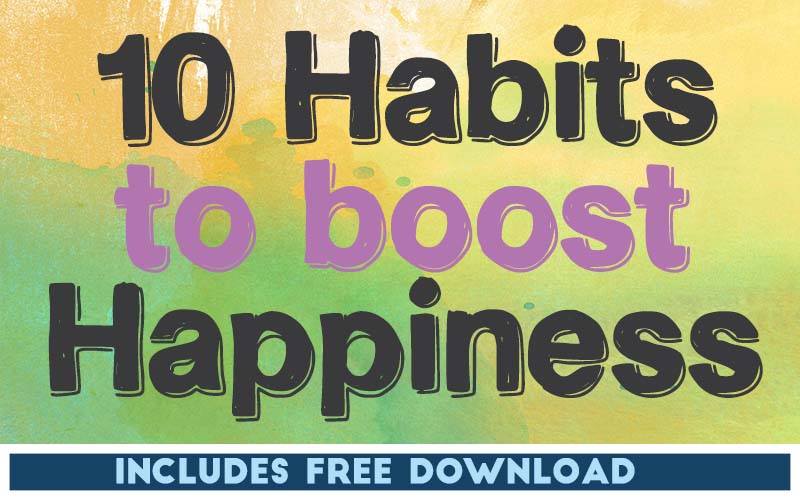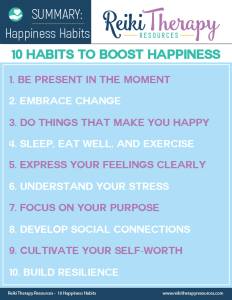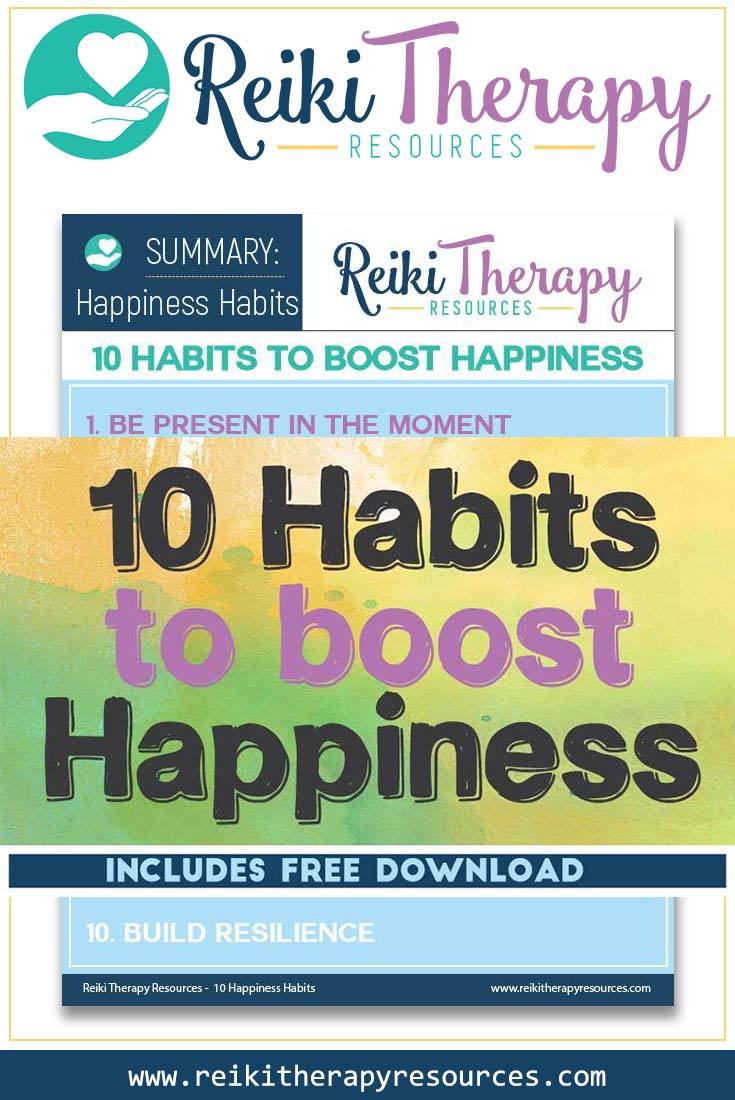
THIS POST INCLUDES:
——————————————–
1. Define Happiness
2. 10 Happiness Habits
3. Pursuit of Happiness
4. Free Download Summary 10 Happiness Habits
DEFINE HAPPINESS
Based on work by Positive Psychologist Martin Seligman, there are three main types of happiness:
- Pleasure and gratification – where you try to do everything that makes you feel good and get immediate satisfaction. This type of happiness provides temporary moments of joy that may add to life.
- Strengths and virtues – where things aren’t always easy, but you gain enjoyment from the involvement in work, relationships, and developing skills.
- Meaning and purpose – where you challenge yourself and experience joy from the achievement of overcoming challenges. You identify and use your strengths for a larger goal instead of only your individual desires and needs.
The second and third definitions relate being happy to living a life according to virtues and achieving your potential. It includes personal autonomy and engaging in personal and community-based activities. They also help us aspire to a deeper purpose for living.
However, the achievement of engaged and meaningful happiness can sometimes require difficult choices, sacrifices, and challenges. However, through these challenges, we can experience deeper contentment that surpasses the quicker experience of hedonistic immediate happiness.
Within each of these types, there are many activities and beliefs that we can explore to help foster happiness. These activities and beliefs deliver the most benefit to us when they are incorporated into our lives as habits that we regularly undertake. This doesn’t have to mean a daily habit and in the case of beliefs, we are often battling other limiting beliefs that take time to overcome.
10 HAPPINESS HABITS
Included in this blog post are a few habits we can introduce in our lives that will help contribute to our experience of general happiness. You may have already mastered some habits. For the habits that are new to you, start small and take the tortoise approach over the hare to ensure a better chance of long-term success.
1. Be present in the moment
We can choose to have periods of quiet and stillness. This can be done through meditation or other activities such as swimming, walking, yoga, or having a cup of tea and enjoying the sanctity of nature. Being present can calm us and soothe our nerves and worried minds. It can also help us reflect on our intentions and purpose in a situation.
2. Embrace change
Change can sometimes instill an element of fear in us when it threatens to disrupt the comfort, predictability, and security that we have worked so hard to establish. However, although those elements provide us with a sense of stability, they can also invoke a fixed mindset that makes it difficult for us to experience personal growth. Furthermore, it can also embed us into an understanding that life should be a certain way, instead of understanding that life is sometimes unpredictable and requires us to adapt.
Change can also invite stimulation in the form of new tasks that are challenging, meeting new people, or experiencing difficult lifestyles and cultures that can broaden our horizons. These changes can be a motivating factor that helps us bring new ideas and understanding to our life. We can start to embrace change on a smaller scale by moving furniture around, cooking something different, or starting a conversation with a stranger.
3. Do things that make you happy
What gives you joy? It could be listening to music, going to an art exhibition, watching sport with your favorite team playing, dancing with your friends, gardening, going on road trips, video games, cooking, or swimming
The activities and hobbies that we engage in can provide a feeling of happiness for a variety of reasons including:
- Developing new skills
- Achieving a sense of accomplishment
- Connecting with others
- Releasing stress and tension through endorphins
- Disconnecting from work and other stressful environments
Try to set aside 30-60 minutes to focus on these activities – new music to listen to, walking outside in nature, cooking, reading, seeing a friend for a meal or a coffee, or watching a movie. If you’re creative and like doing projects, work a little bit each day towards it. This might be writing a novel, learning guitar, starting a vegetable garden, or cooking new recipes. You don’t need to do everything, just choose one thing you like doing and start.
4. Sleep, eat well and exercise
Eating a whole-food based diet can help your body function so you have more energy and a large capacity for focus. This can improve your happiness because you feel better and have more energy for your day. If eating well has not been a part of your previous regime, start with improving your choices for at least one meal each day.
For exercise, start with something fun and easy like dancing, yoga, or walking. You don’t need to start with high intensity and grueling exercises. You’ll soon notice that apart from having more energy and feeling less stressed, you want to keep doing more exercise. The endorphins and adrenalin we receive from exercise provide a natural high and can help us relax. Additionally, expending physical energy can redirect our attention so our minds can reprieve from ruminating on difficult situations.
Sleep is an important habit that the body requires so your mind and physical body can rejuvenate and repair before another day. Without adequate sleep, we can become stressed, irritable, and can make poor decisions. Sleep gives us the necessary respite to enable us to sustain life. Many studies have shown that sleep deprivation over an extended period of time can have significant consequences in both the short and long term for both our physical and mental wellbeing.
5. Express your feelings clearly
In our lives, we experience situations that trigger an emotional response from us. In many cases, people often respond in one of three ways: emotional outbursts, emotional suppression, or safe emotional expression. The reality is that for many of us who were not taught how to handle our emotions, we often swing between emotional outbursts or emotional suppression. We are not taught to identify and honor our emotions by safely expressing how we feel.
The most beneficial way of coping with difficult situations is through open, honest but amiable discussions that explore our expectations, perceptions, and assumptions that we hold. Communicating our emotions remains one of the most important pathways to fully developing strong relationships with our family and friends.
6. Understand what elevates your daily stress levels
Being aware of what elevates your stress levels on a daily basis is vital to understanding how to foster happiness in your everyday life. While there are big events that can occur in our life that are stressful, we also carry the impact of minor stresses that cumulatively impact our lives in a negative way. If you know that having a cluttered house makes you feel annoyed, or you find driving long distances to work irritating, then try to find strategies to eliminate or reduce this stress from your life. Tidy up the dishes even if you don´t have time to wash them, or make sure you at least put dirty clothes in the hamper even if you can´t wash them right then. You may be able to find a similar job that is closer to your house or take a route by public transport or carpool with a colleague.
If you aren´t able to effectively eliminate or reduce these stresses right away, then identify healthy comfort strategies to help you reduce the stress in your life. Put into practice some stress management strategies that help counteract these annoyances and don’t try to ignore them.
7. Focus on your purpose
Some days you may feel overwhelmed at all of the things you have to do in your life. But if you are finding yourself trying to attend to too many people, issues, and tasks then it might be time to take a breath.
Personal reflection for a few minutes every day can help you identify the important and less important tasks that are taking up your mental and physical time each day. This can help you identify what is going on in your life that serves your overall purpose of pursuing a happier and more content life. You may ask yourself, is what I’m doing and who I think I should be consistent? Are my values matching my actions?
Take the time to understand your values and how you can incorporate them into your daily life. This can refer to developing more kindness towards others or honoring your desire to be more truthful about how you feel.
8. Social connections
Social connections can extend across many identifiers including gender, race, sexual orientation, religious boundaries, geographical boundaries, and with shared interests. Establishing and maintaining social connections across all similarities and differences is important for our happiness levels by developing our emotional, psychological, and physical needs.
If we don’t create social connections amongst different groups, this can negatively impact our levels of happiness as we then focus on who is not similar to us. Reaching across demographic boundaries helps create friendships and positive relationships which impact our happiness and the happiness of others.
Social connections are an important component of developing happiness. Research shows that people who feel happy develop social connections that result in spending time with others and developing emotional connections. There is a strong link between social connections and physical and psychological health. Social connections, through the process of healthy relationships, positively affect the quality of life and life satisfaction.
Connections with family, friends, and community involvement provide a foundation of belonging, respect, and finding purpose in life. Social connections, along with health and security, form three important factors that contribute to healthy aging.
Research indicates that even superficial social connections such as saying hello to a stranger on the street or holding a door open for a stranger can boost our mood. Some other examples include engaging in conversation with retail workers, asking a coworker about their wellbeing, or talking to someone you sit with on public transport. Shared conversations can lead to exploring shared life experiences which then begin to deepen our perception of others around us.
9. Cultivate your sense of self-worth
Self-worth can be viewed as an intrinsic value that all individuals possess regardless of their own evaluations. Self-worth is connected with your value as a human compared to the self-esteem you may develop from your achievements, skills, and acceptance of social norms.
The level of self-worth that an individual possesses fluctuates across the lifespan as cognition develops. It follows a similar path to the levels of self-esteem that an individual develops over the lifespan. As self-worth is an existential concept relating to humanistic value, an individual will grasp the concept of self-worth with the assistance of personal exploration of the self.
An individual’s foundation of self-worth can vary across different aspects of our lives including:
- Biological – the influence of self-worth on establishing safety, security, and healthy living protocols in life
- Cognitive – the influence of self-worth on preserving memories, developing curiosity and understanding about learning
- Developmental – the influence of self-worth on progressing through the lifespan and embracing each stage of physical and cognitive change
- Social – the influence of self-worth on interpersonal relationships, social interactions, and emotional development
By understanding where we are positioned with regard to these domains, we can understand some of the motivations behind our held beliefs of self-worth.
10. Build resilience
Resilience refers to the capacity we have to bounce back from difficult situations. Resilience is not ignoring or suppressing the emotional effects of difficult situations, but instead, it is the ability to process emotions and thoughts and resume normal functioning despite difficult situations.
To be resilient means facing everyday stress as well as singular trauma events. Trauma events can present as a distinct event, however, daily stress can develop and grow in intensity as we go about our daily lives. For some people, this stress can build for a short period of time before an emotional break occurs. For others, the accumulation of daily stress results in exhaustion and begins to change the fundamental beliefs a person has about their ability to cope with life.
Life is unavoidably difficult whether it be through traumatic events or daily stress. To protect our overall wellbeing it is important to learn skills that will help us become resilient.
PURSUIT OF HAPPINESS
Experiencing constant happiness is not realistic and it is important to understand that the pursuit of endless happiness can create significant dissatisfaction in our lives. This is primarily because we are reaching for an unobtainable goal.
It is helpful to understand the concept of hedonic adaptation which refers to how we return to a stable level of happiness despite positive or negative events in our life. This provides us with insight into the pursuit of happiness where we may achieve a level of happiness due to an experience or event, and then our mood and perception of our happiness will soon return to our baseline level after some time has passed from that experience or event occurring.
This is not to suggest that setting a goal to be happier is futile. More importantly, it is a reflection on how pursuing happiness contains a list of caveats and perspective-taking to fully benefit from setting these goals.
FREE DOWNLOAD
SIGN UP below to receive your FREE DOWNLOAD. Once you enter your email address, you will receive access to the Free Summary 10 Happiness Habits

BUILD YOUR REIKI REFERENCE MATERIALS:
Pin this image to your Pinterest board.

SHARE KNOWLEDGE & PASS IT ON:
If you’ve enjoyed this post, please share it on Facebook, Twitter, Pinterest. Thank you!
